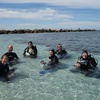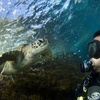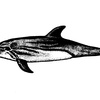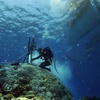
Redmap NSW wins award!
Redmap NSW has just won the Community Award at the Annual NSW Coastal Management Awards. Congratulations!



Redmap NSW has just won the Community Award at the Annual NSW Coastal Management Awards. Congratulations!

Redmap has received more than 1500 sightings of marine life around Australia that people deemed uncommon in their local seas. This edition of Redmap news reviews the citizen science including the Top 3 sightings per state. Also, read interviews with Redmap members around Australia and other marine news! Check out the newsletter here.

Australian fishers, divers and beachcombers have documented some 1500 sightings of marine life they considered uncommon in their local seas. Many of the Redmap sightings were species out of their usual home range (distribution); and others were valuable observations of rare or poorly-studied species that we'll track over time. And it looks like the scuba divers beat the fishers for uploading the most sightings on Redmap! Here's a snapshot of Redmap's citizen …

Commercial diver Bryan Denny has no regrets starting his career as a teenager when he'd skip school to fish with local abalone divers. Read about his life on the sea and the changes he's seen over the years.

A recent article in The Conversation detailed how Redmap volunteers are helping scientists track movements in marine species around Australia's vast coastline. Read the article here.

More than 20 Redmap Champions will now wear the Redmap t-shirt and help promote the project to fishers, divers, boaters and the community throughout Western Australia!

Warming seas and the migration of species will change the marine environment on our doorstep, according to Queensland researchers. Read more in the Sunshine Coast Daily.

DOLPHIN WATCH in WA gathers community observations of one of the Swan Canning Riverpark’s most iconic species: the Indo-Pacific bottlenose dolphin (Tursiops aduncus). Read about this fantastic citizen science project at Science Network WA.

A new study by University of Tasmania researchers and international collaborators has found that a key element of future changes in the distribution of marine biodiversity resulting from ocean warming is not as closely related to local warming rates as previously assumed. Read more in the University of Tasmania News.

A team of marine scientists have discovered that WA's coral reefs contain weather maps going back hundreds of years. The scientists, from the University of WA and Curtin University, drilled into giant porite corals on Ningaloo Reef, the Abrolhos Islands and Rowley Shoals to find the marine weather data. They discovered that the core samples were able to tell them what causes marine heat waves among WA's unique coral reefs. Read …